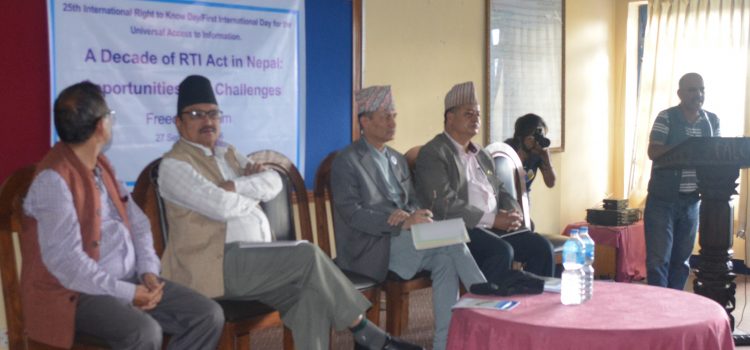Freedom Forum organized a discussion program named ‘A Decade of RTI Act in Nepal: Opportunities and Challenges’ in Kathmandu on September 27 marking the First International Day of Universal Access to Information.
During the program, the speakers from government bodies and civil society discussed multifarious issues of good governance linking it to the Right to Information (RTI) Act in Nepal on Tuesday. The celebration of the First International Day to Universal Access to Information coincided with a decade of introduction of the RTI Act in Nepal. The RTI is taken as one of the most vibrant and effective tools to build good governance.
The UN Assembly in 2015 had approved September 28 as the International Day. At the program organized by freedom1 Forum, Chief Information Commissioner, Krishna Hari Baskota, expressed concern why the government officers were reluctant to share information of public concern. “Information sharing is not only for citizen’s rights but for the promotion of information culture within the bureaucracy which boosts transparency,” he argued, admitting that RTI was yet to be engrained in grassroots. Farmers and workers should be aware of their rights through the publicity of RTI, he underscored. The Chief Commissioner Baskota warned the Information Officers of action if they did not abide by the RTI Act.
On the occasion, Member of the National Human Rights Commission, Sudip Pathak, wondered why none was seeking information with the NHRC in the recent past while there were piles of complaints during the conflict period. “Only one RTI application was filed in the last two years at NHRC. Why none wants to get information about the follow ups NHRC made on the conflict-related complaints,” he underscored.
Dr Ramkrishna Timalsena, who had an active engagement during introduction of the RTI Act in Nepal, observed that RTI was for promoting participatory democracy. “RTI is such mighty tool that helps transform political democracy to social and economic democracy which Nepal is in dire need of.”
Similarly, Chief Executive of Freedom Forum Taranath Dahal said broader acceptability of RTI was the need of hour. RTI is for bolstering the fundamental values of democracy where people are supreme. “RTI is the mother tool to ensure good governance, transparency and accountability,” he underlined.
Chairman of the Campaign for Human Rights and Social Transformation (CAHURAST) Bishnu Pukar Shrestha said although our political parties advocate for people’s rights and empowerment, they suppress RTI by encouraging the concealment of information. “CAHURAST had demanded information about the reconstruction of the Bhaktapur Durbar Square, but the concerned authority was delaying much,” he said, venting ire, “What’s the reason here to keep secret the information about reconstruction activity?”
According to him, educating rural people about RTI, empowering them with information and engaging on RTI campaign could be result-oriented activities for good governance.
The speakers were univocal that supremacy of people is maintained when people’s rights are respected. For this, openness is the urgent need among the public bodies. RTI boosts the culture of openness which incorporates the people’s aspiration and respects their rights. A decade of RTI practice in Nepal has at least paved a way for open society, the integral part of democratic governance, they underlined.
The program was attended by 40 persons including Information Officers from the Ministries, Director General of Department of Information, Chief Commissioner of the National Information Commission, Member of the National Human Rights Council, RTI activists and campaigners, RTI experts, journalism students, among others.

